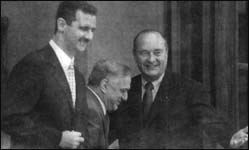 |
| Vol. 1 No. 11 | November 1999 |
 |
| Chirac warmly welcomes Bashar Assad |
According to informed sources in Damascus, however, the primary underlying purpose of the meeting was to help insulate Bashar from the political challenge posed by Rifaat Assad. Although Rifaat has garnered important international connections in Europe and the United States during his exile, he clearly cannot count on France for diplomatic recognition in the event that his supporters seize power in Damascus. In recent months, Bashar has embarked on a number of highly-publicized visits to Arab states, including Kuwait, the United Arab Emirates, and Lebanon to build his credentials as the next president of Syria.
Although his first diplomatic foray outside the Middle East was effusively praised in the official Syrian press, by most other accounts Bashar appeared less than "presidential" in Paris. Questioned by reporters afterwards as to his future political role in Syria, Bashar replied somewhat inscrutably that "there is a leadership in Syria which determines each person's role" and that he would "respect" whatever decision is made.1
Bashar has been groomed for succession by his father since 1994, when his older brother Basil died in an automobile accident. Although he occupies no formal government position and has only attained the military rank of colonel, he has been put in charge of a number of portfolios, most notably state security and relations with Syria's network of allies in Lebanon.
1 Al-Quds al-Arabi, 8 November 1999